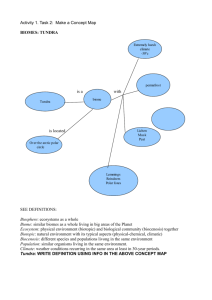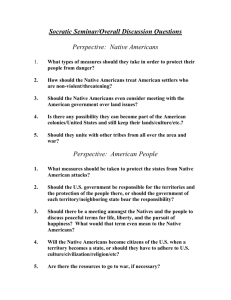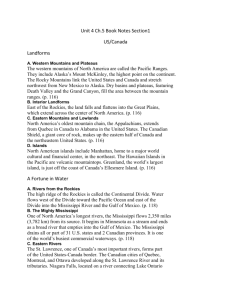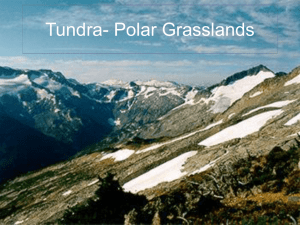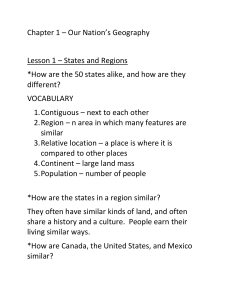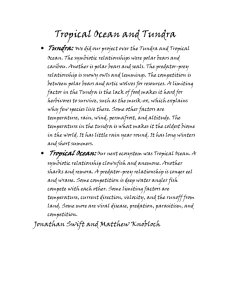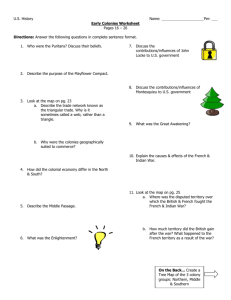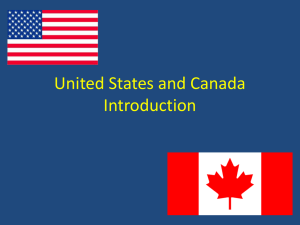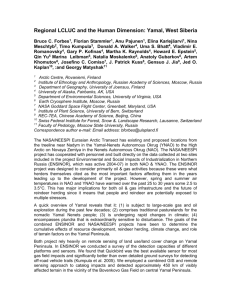YAMAL means THE EARTH'S END – translated from Nenetz into
advertisement
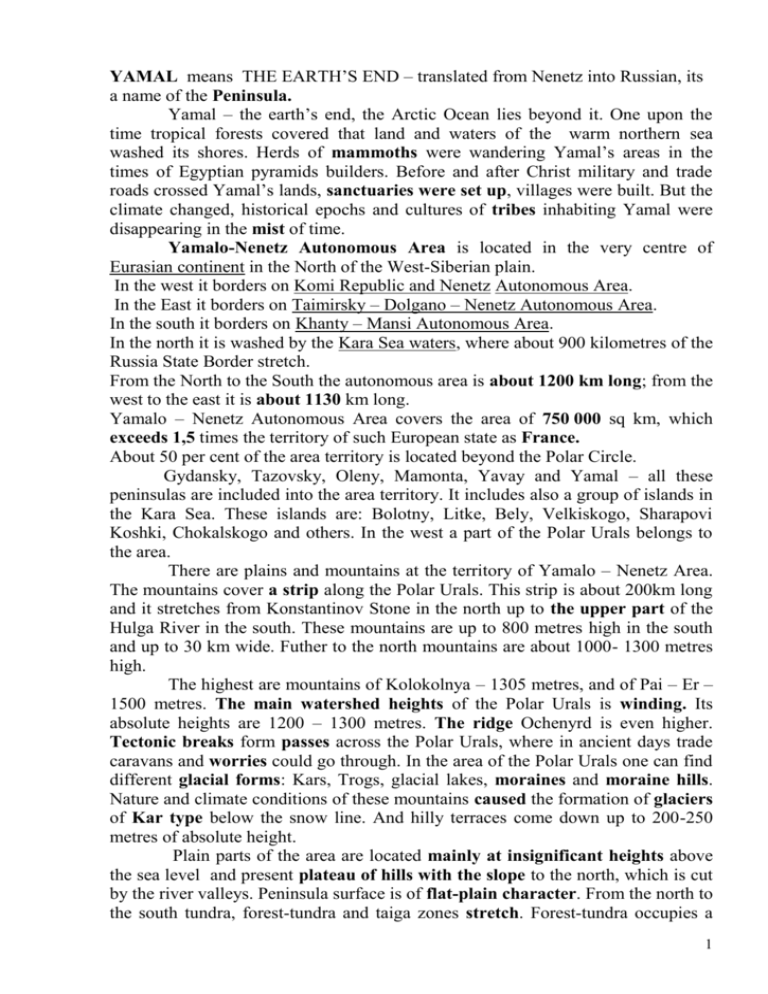
YAMAL means THE EARTH’S END – translated from Nenetz into Russian, its a name of the Peninsula. Yamal – the earth’s end, the Arctic Ocean lies beyond it. One upon the time tropical forests covered that land and waters of the warm northern sea washed its shores. Herds of mammoths were wandering Yamal’s areas in the times of Egyptian pyramids builders. Before and after Christ military and trade roads crossed Yamal’s lands, sanctuaries were set up, villages were built. But the climate changed, historical epochs and cultures of tribes inhabiting Yamal were disappearing in the mist of time. Yamalo-Nenetz Autonomous Area is located in the very centre of Eurasian continent in the North of the West-Siberian plain. In the west it borders on Komi Republic and Nenetz Autonomous Area. In the East it borders on Taimirsky – Dolgano – Nenetz Autonomous Area. In the south it borders on Khanty – Mansi Autonomous Area. In the north it is washed by the Kara Sea waters, where about 900 kilometres of the Russia State Border stretch. From the North to the South the autonomous area is about 1200 km long; from the west to the east it is about 1130 km long. Yamalo – Nenetz Autonomous Area covers the area of 750 000 sq km, which exceeds 1,5 times the territory of such European state as France. About 50 per cent of the area territory is located beyond the Polar Circle. Gydansky, Tazovsky, Oleny, Mamonta, Yavay and Yamal – all these peninsulas are included into the area territory. It includes also a group of islands in the Kara Sea. These islands are: Bolotny, Litke, Bely, Velkiskogo, Sharapovi Koshki, Chokalskogo and others. In the west a part of the Polar Urals belongs to the area. There are plains and mountains at the territory of Yamalo – Nenetz Area. The mountains cover a strip along the Polar Urals. This strip is about 200km long and it stretches from Konstantinov Stone in the north up to the upper part of the Hulga River in the south. These mountains are up to 800 metres high in the south and up to 30 km wide. Futher to the north mountains are about 1000- 1300 metres high. The highest are mountains of Kolokolnya – 1305 metres, and of Pai – Er – 1500 metres. The main watershed heights of the Polar Urals is winding. Its absolute heights are 1200 – 1300 metres. The ridge Ochenyrd is even higher. Tectonic breaks form passes across the Polar Urals, where in ancient days trade caravans and worries could go through. In the area of the Polar Urals one can find different glacial forms: Kars, Trogs, glacial lakes, moraines and moraine hills. Nature and climate conditions of these mountains caused the formation of glaciers of Kar type below the snow line. And hilly terraces come down up to 200-250 metres of absolute height. Plain parts of the area are located mainly at insignificant heights above the sea level and present plateau of hills with the slope to the north, which is cut by the river valleys. Peninsula surface is of flat-plain character. From the north to the south tundra, forest-tundra and taiga zones stretch. Forest-tundra occupies a 1 narrow strip from the west to the east, 15-200 km long, separating the tundra and taiga parts of the area. About 17% of the territorial autonomous formation is located under water. The swamps cover about 4% of the territory. Swamps, rivers, and lakes cover its territory. According to hydrological data more then 300 thousand lakes are located in that area. The majority of them are of glacial origin. The lakes are not large and not deep and the largest of them are Neito, Pyakuto, Yarato, Varcheto, Yambuto, Nembuto, Chaselskoye, Devil lakes. Their area makes hundreds of square metres. Bolshoye Shuchye Lake in the mountains of the Polar Urals is up to 140 metres deep. The general area of the lake system exceeds one million four hundred thousand hectare. Totally the area of reservoirs in Yamal is about 64 thousand of square kilometers. This territory consists of all the areas of lakes, rivers and inlets of the Kara Sea. Taz Inlet is about 16 thousand hectares. The water area of the Ob River together with the Ob Inlet is about 5,5 million hectares. The Ob River together with its inlets in the area territory is over 1,5 thousand kilometers long. All together the number of rivers is about 48 thousand. The biggest of them is Ob. It is one of the biggest rivers in the world. The rivers Shuchya, Sob, Longot-Ugan, Pur are big and navigable too. Together with their inlets their length is over 2000 kilometres. All minor rivers, with the exception of tundra zone rivers at the Gydan and Yamal Peninsulas, belong to the basins of the rivers Ob, Pur, Taz and Nadym. The area climate is determined by its location at the Eurasian continent, by its long distance from Atlantic and Pacific Oceans, by the warm Gulf Stream and by the closeness of the Arctic Ocean. REVIEW OF THE TEXT Yamal means the Earth’s End in Nenetz language. Many centures ago tropical forests covered Yamal and herds of mammoths were wandering that area. Before and after Christ military and trade roads crossed Yamal’s lands, sanctuaries were set up, villages were built. Yamalo-Nenetz Area is located in the very centre of Eurasian continent in the North of the West-Siberian plain. It covers the area 0f 750 000 sq km, which exceeds 1,5 times the territory of such European state as France. Gydansky, Tazovsky, Oleny, Mamonta, Yavay and Yamal – all these peninsulas are included into the area territory. There are plains and mountains at the territory of Yamalo-Nenetz Area. The mountains cover a strip along the Polar Urals. These mountains are up 800 metres hifh in the south and up to 30 km wide. Tectonic brakes form passes across the Polar Urals. There are Kars, Trogs, glacial lakes, moraines and moraine hills. Plain parts of the area are located mainly at insignificant heights above the sea level plateau of hills with the slope to the north, which is cut by the river valleys. Peninsula surface is of flat-plain character. From the north to the south tundra, forest-tundra and taiga zones stretch. About 17% of the territotiral formation is located under water. The swamps cover about 4% of the territory. According to hydrological data more than 300 thousand lakes are located in that area. The area 2 of lakes makes hundreds of square metres. Totally the area of reservoirs in Yamal is about 64 thousand of square kilometers. All together the number of rivers is about 48 thousand. The biggest of them is Ob. The rivers Shuchya, Sob, Logo-Ugan, Pur are big and navigable too. The area climate is determined by its location at the Eurasian continent, by its long distance from Atlantic and Pacific Oceans, by the warm Gulf Stream and by the closeness of the Arctic Ocean. Fill in the table. The name The climate Lakes Location and borders Swaps Size of the Peninsulars Mountains territory The area reservoirs of The highest mountaim Rivers Write down the sentences according to the table. ( not less than 15) Put the questions to the sentences (not less 7). Make up the dialogue, exchanging the questions and starting with the words. - Would you like to change the place of your living? - I’d love to. ( By no means) - ( Хотелось бы тебе поменять место своего проживания? - ( Хотелось бы очень) ( Ни в коем случае) Реплик не менее 12 со стороны каждого. Three subzones are in the territory of Yamalo-Nenetz Area: bushes or southern, typical, or moss-lichenery and Arctic zones, further to the north Arctic “deserts”. In the south there are widely spread bushes: draft birch trees, shrub alder spreaded, willows. In tundra we may find several types of willow: blue-gray, Lappish, filicolist, shaggy and others. Berries grow in abundance: cloudberry, red whortleberry, great bilberry, bilberry, speedwell or veronica. Further to the north from Taz Inlet latitude typical tundra is located. It reaches Kharasaway and Sabetta latitudes. The main plant there is moss, which makes peculiar tundra cover. In typical tundra one may find plants from the south: red whortleberry, great bilberry, willow, alder and others. At last we have kingdom of Arctic tundra. There are almost no bush plants there. Arctic tundra ends in the Kara Sea. In the sea one can find three types of seals: ringed seal, bearded seal,Greenland seal. Giant walruses come out to the beaches of the northern area seacoast. Greenland whales move along the seacoast, their 3 weight is up to 100 tons. In summer runs of northern dolphins- white whales that live in the Kara Sea come to Ob, Taz, Guydan Inlets chasing the fish. The area reservoir world is very rich. In the river basins the most numerous in the world runs of sig species fish live, making about 70% of Russian fish stock of this species. White salmon, sturgeon, starlet, taymen, grayling, umber, smelt, omul, plaice, flounder, flat-fish, navaga, hunchback salmon, loach, saiga, fourhorn sculpin, inhabit those waters. The so-called “black fish” burbot, pike, ide, ruff and others live in these water reservoirs. Many of this fish species are food fish and some of them are recorded in Russian and regional Red books. Peculiar is feathered world of birds – ducks, owls, seagulls, geese, swans and others. Some rare types of birds such as the white-tailed eagle or breasted goose are recoded in the Red book. Read the text and make the table on your own. Write down the sentences according to your table. 4
